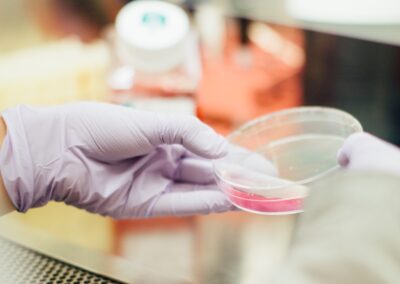Exploring the Ethical and Technical Hurdles of CRISPR Technology
Understanding CRISPR and Its Potential
The advent of CRISPR (Clustered Regularly Interspaced Short Palindromic Repeats) technology has revolutionized the field of genetic editing, offering unprecedented possibilities for human enhancement. This technology enables precise modifications to DNA, potentially eradicating genetic disorders and enhancing human capabilities. However, the application of CRISPR for human enhancement is fraught with challenges and limitations that must be addressed to ensure ethical and safe implementation.
CRISPR technology’s promise lies in its ability to edit genes with high precision. For instance, it can potentially eliminate hereditary diseases such as cystic fibrosis and sickle cell anemia. Beyond therapeutic uses, CRISPR holds the promise of enhancing human traits such as intelligence, physical strength, and disease resistance. In regions like Saudi Arabia and the UAE, where advancements in healthcare and technology are prioritized, the potential benefits of CRISPR are significant.
Despite its potential, the application of CRISPR for human enhancement raises numerous ethical concerns. One of the primary issues is the risk of creating genetic inequality. If genetic enhancements are available only to the wealthy, it could exacerbate social disparities. Moreover, the long-term effects of genetic modifications are still unknown, posing significant risks to individuals and future generations. Addressing these ethical dilemmas is crucial for the responsible use of CRISPR technology.
Technical Challenges and Limitations
The technical limitations of CRISPR technology are significant hurdles that must be overcome to realize its full potential for human enhancement. One of the main challenges is off-target effects, where unintended genetic modifications occur. These off-target mutations can lead to unforeseen health issues, making the technology less reliable. Ensuring the precision of CRISPR edits is vital to minimize these risks and enhance the technology’s safety.
Another technical challenge is the delivery of CRISPR components to target cells. Efficient delivery systems are essential for the success of genetic editing. Current methods, such as viral vectors, have limitations, including potential immune responses and limited targeting capabilities. Developing more efficient and safe delivery mechanisms is critical for advancing CRISPR technology for human applications.
Moreover, the complexity of human genetics poses a significant challenge. Traits such as intelligence and physical abilities are influenced by multiple genes and their interactions. Modifying these complex traits requires a comprehensive understanding of genetic networks, which is currently limited. Advances in genomic research and computational tools are needed to decipher these complexities and enable precise genetic enhancements.
Ethical Considerations and Societal Impact
The ethical implications of using CRISPR for human enhancement are profound and multifaceted. One major concern is the potential for “designer babies,” where parents select desirable traits for their offspring. This raises questions about the natural diversity of humans and the ethicality of altering fundamental aspects of human identity. In societies like Saudi Arabia and the UAE, where cultural and religious values play a significant role, these ethical considerations are particularly relevant.
In addition to ethical concerns, the societal impact of genetic enhancements must be considered. If CRISPR technology becomes widespread, it could lead to a new form of eugenics, where certain traits are valued over others. This could exacerbate existing social inequalities and create new forms of discrimination. Establishing regulatory frameworks and ethical guidelines is essential to prevent misuse and ensure that genetic enhancements are used for the greater good.
Public perception and acceptance of genetic enhancements also play a crucial role. Education and transparent communication about the benefits and risks of CRISPR technology are necessary to build public trust. Engaging with diverse stakeholders, including ethicists, scientists, policymakers, and the public, is vital to developing a consensus on the ethical use of CRISPR for human enhancement.
Strategies for Addressing CRISPR Challenges
Advancing Technical Capabilities
To address the technical challenges of CRISPR technology, ongoing research and development are essential. Improving the precision of genetic edits to minimize off-target effects is a critical focus area. Advances in bioinformatics and machine learning can aid in predicting and reducing these unintended modifications. Additionally, developing non-viral delivery methods, such as nanoparticles, can enhance the safety and efficacy of CRISPR applications.
Collaboration between academia, industry, and government agencies can accelerate the development of innovative solutions. In regions like the UAE and Saudi Arabia, fostering such collaborations can drive technological advancements and ensure that these nations remain at the forefront of genetic research. Investment in research infrastructure and talent development is crucial for building a robust ecosystem for CRISPR innovation.
Furthermore, integrating CRISPR technology with other emerging fields, such as synthetic biology and regenerative medicine, can expand its potential applications. For example, combining CRISPR with stem cell therapy can offer new avenues for treating genetic disorders and enhancing human capabilities. This multidisciplinary approach can overcome existing limitations and unlock new possibilities for human enhancement.
Establishing Ethical and Regulatory Frameworks
Developing comprehensive ethical and regulatory frameworks is imperative for the responsible use of CRISPR technology. These frameworks should address issues such as consent, privacy, and the long-term implications of genetic modifications. Establishing international guidelines can ensure consistency and prevent unethical practices. Engaging with global organizations, such as the World Health Organization, can facilitate the development of these frameworks.
In addition to global guidelines, national regulations must be tailored to the specific cultural and societal contexts of each region. In Saudi Arabia and the UAE, regulations should consider the unique ethical and religious perspectives of these societies. Inclusive policy-making processes that involve diverse stakeholders can ensure that regulations are culturally sensitive and widely accepted.
Public engagement is also crucial for the successful implementation of ethical guidelines. Educating the public about the potential benefits and risks of CRISPR technology can build informed communities that can participate in decision-making processes. Transparency and open communication can foster public trust and support for responsible genetic enhancements.
Promoting Inclusive and Equitable Access
Ensuring equitable access to the benefits of CRISPR technology is essential for preventing social disparities. Efforts should be made to make genetic enhancements accessible to all, regardless of socioeconomic status. Subsidizing the cost of genetic therapies and investing in public healthcare infrastructure can help achieve this goal. In regions like Riyadh and Dubai, leveraging public-private partnerships can enhance access to cutting-edge medical technologies.
Moreover, promoting diversity in genetic research is vital for addressing the needs of different populations. Ensuring that genetic studies include diverse ethnic groups can lead to more inclusive and effective genetic therapies. Collaborative research initiatives that involve institutions from various regions can enhance the global applicability of CRISPR technology.
Fostering international cooperation and knowledge-sharing can also contribute to equitable access. By sharing best practices and resources, countries can collectively address the challenges of CRISPR technology and maximize its benefits for humanity. In the interconnected world of today, global solidarity is key to overcoming the limitations and realizing the full potential of genetic enhancements.
In conclusion, the integration of CRISPR technology for human enhancement presents significant challenges and limitations that must be addressed. Technical hurdles, ethical considerations, and societal impacts require comprehensive strategies and collaborative efforts. By advancing technical capabilities, establishing ethical frameworks, and promoting equitable access, regions like Saudi Arabia, the UAE, Riyadh, and Dubai can lead the way in harnessing the potential of CRISPR technology. The future of genetic enhancement lies in responsible innovation, guided by ethical principles and a commitment to the greater good.
—
#CRISPR #GeneticEditing #HumanEnhancement #Bioethics #SaudiArabia #UAE #Riyadh #Dubai #ArtificialIntelligence #Blockchain #BusinessSuccess #LeadershipSkills #ProjectManagement























